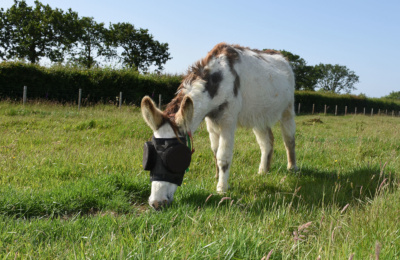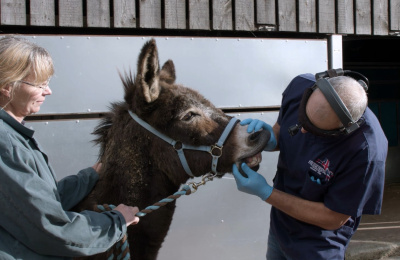A donkey’s life expectancy in the UK is around 30 years, but some live well into their 50s. Meet some of our elderly donkey herd, and the grooms who dedicate themselves to caring for our golden oldies right to the end of their ‘donkey’s years’.
A promise of life-long care
At The Donkey Sanctuary, we promise to provide all our donkeys with sanctuary from suffering for life.
When you consider that ‘life’ for a donkey can last into their fifties, keeping this promise is no mean feat. Like all of us, donkeys can develop health problems associated with old age, and their needs can become greater as they grow older.
Although every donkey is different, most start showing signs of old age at around 20 – at which point we consider them to be ‘elderly’ and will adjust their care accordingly.
Phineas’ life at The Donkey Sanctuary
Phineas is the perfect example of a friendly face who has known nothing but love and care throughout his life – he has been at the sanctuary since he was a little foal. 22 years later, he is enjoying a slower-paced life with our elderly herd in Sidmouth.
In his younger days, Phineas could be found at the Donkey-Assisted Therapy Centre in Sidmouth helping children with additional needs. All this time later, he still dotes on human attention, and enjoys his relaxed lifestyle.
The signs of Phineas’ old age are quite visible – a slightly dipped back, patchy coat, adorable droopy lips from missing teeth, and a much slower gait – but he is kept comfortable and his affectionate character always shines through.
As Phineas has aged, we’ve made some changes to his care routine to make sure he’s as happy, healthy and comfortable as a donkey could be. Adjustments for elderly donkeys include changes to diet, dust-free bedding, extra warmth, and more frequent veterinary checks and visits from the dentist.
Paris’ journey from rolling hills to gentler slopes
At 18 years old, Paris is one of the younger members of our elderly community.

Paris used to reside on the hills of Hurfords, which are ideal for our more rambunctious herd members who benefit from the exercise of moving up and down terrain (quite often at surprising speed).
Staff members noticed that Paris was finding the hills an increasing struggle, and his ease of breathing had rapidly deteriorated.
Bianca Hickling manages some of the herds at Hurfords, and knew that Paris’ condition needed investigating further.
“Paris was so bad,” she said. “You could hear him struggling to breathe.”
After spending some time at our Donkey Hospital, where vets carried out scans and other tests, Paris was diagnosed with lung fibrosis and a collapsed trachea – a condition where the windpipe loses its shape and cannot function effectively. Collapsed trachea can happen at any age, but is more common in older donkeys.
The decision was made to move Paris to our herd of elderly donkeys to enable him to take life more slowly. His new home in Donkey Week Barn is adapted to suit Paris and other donkeys who have respiratory problems.
As well as the flatter fields, dust-extracted wood shavings replace straw bedding and finely-chopped specialist feed all contribute towards a dust-free environment. These alterations are costly but absolutely essential for donkeys like Paris to enjoy a comfortable and fulfilled life.



Bianca was thrilled to see Paris’ progress with his new herd:
“The flat ground means he’s not over-exerting himself like he was at Hurfords, and the change in bedding has made a big difference. I’ve seen him now outside playing and galloping around – he’s got a new lease of life!”
Golden oldies: meet more of the herd
Kerry Layton-Hill is part of the team caring for Paris and his herd in Donkey Week Barn, as well as Naughty Face Barn. The pace of life for donkeys in Kerry’s care is much slower than for our younger, more boisterous herds – you can tell from the moment you walk in that there’s an air of calmness and tranquillity about the place.
Kerry introduces us to some of the donkeys in the elderly group, who are more than keen for a bit of fuss, and the special measures the team takes to ensure they are living in comfort.
She tells us about twenty-eight-year-old Nina, who has started to lose her vision in both eyes.
“Nina is really sweet. We always call her name nice and loud so she knows when we’re coming and we don’t make her jump! She knows this barn well, so we try not to alter anything so she can find her way around.”
Next we are introduced to thirty-five-year-old Patch, one of the oldest donkeys at Trow Farm, who suffers from arthritis. Patch was a working beach donkey for many years and came into our care in 2014.
Kerry said: “Patch takes daily anti-inflammatory medicine disguised in a tasty jam-sandwich! He has frequent checks from the vet and we carry out regular flexion tests to check his mobility."



Dental issues are also common within the elderly group, and many lose teeth as they age. Thankfully, the team are on hand to ensure they get regular dental check-ups, and even brush the teeth of donkeys who need extra help.
Bianca says: “Paddy has sore gums from time to time. We know when his gums are sore by performing ‘the carrot test’. If he struggles to bite through a carrot, then we know he needs some help.”
No matter what problems our older residents may encounter with age, our devoted group of farm staff are there to ensure that their every need is met.
“We keep a very close eye on the donkeys.” Kerry adds. “Whenever they are walking to and from the barn we watch their movement to check they aren’t looking stiff and uncomfortable. If any are struggling, their medication can be adjusted with help from our vets to keep the donkeys happy and pain-free.”
Caring for the elderly group is hugely rewarding – yet it also carries a burden for the grooms who know the donkeys in their care will not stay comfortable forever. This includes the difficult decision to say goodbye to the donkeys who can no longer enjoy a good quality of life as a result of age-related health complications.
Bianca says: “It’s really hard, as we get so bonded to them but we have to do what’s right. At least we know they’ve had a good life and that we’ve done everything we can for them while they’ve been in our care.”
In spite of the challenges it poses, our grooms agree that they wouldn’t change a thing about working with these donkeys.
Kerry adds: “I love looking after the elderly groups. They are so full of character, and each of them has their own story of how they came here and what they’ve been through.
“These barns are like the final stop for donkeys – once they come here, they probably aren’t moving on again. I like to care for them and make sure they’re not in pain, and help to make their final years as fulfilling and comfortable as can be.”












